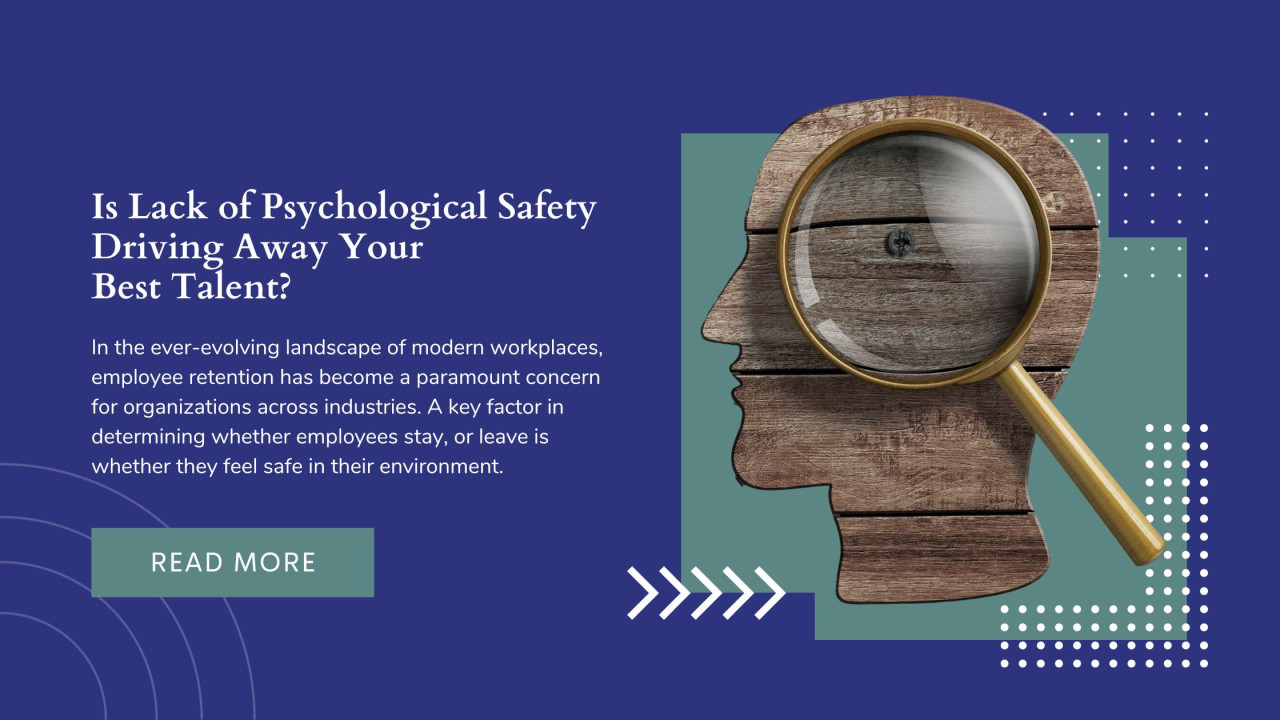(404) 793-0011 | drmaiysha@drmaiysha.com
Is Lack of Psychological Safety Driving Away Your Best Talent?
In the ever-evolving landscape of modern workplaces, employee retention has become a paramount concern for organizations across industries. A key factor in determining whether employees stay, or leave is whether they feel safe in their environment. Most organizations focus on physical safety. However, an overlooked, often under-appreciated equally important factor is psychological safety. While psychological safety is gaining awareness as a critical element for fostering creativity and innovation, its impact on retention rates is often overlooked. Let's take a look at the relationship between psychological safety and employee turnover, exploring how cultivating a safe and supportive environment can lead to improved retention rates.
Understanding Psychological Safety
Psychological safety refers to the belief that one can speak up, take risks, and share their thoughts and concerns, and even make mistakes without fear of negative consequences. When employees feel psychologically safe, they are more likely to express their opinions, challenge the status quo, and admit mistakes. This environment contributes to healthy communication dynamics and leads to high-performance teams that create, innovate, and cultivate a long-term cohesiveness and productivity.
When looking at the relationship between psychological safety and its impact on retaining talent, we must look at the key factors that create the loyalty and motivation to want to remain in their roles and organizations.
The First is Trust and Engagement. A workplace characterized by psychological safety cultivates trust between employees and their supervisors, peers, and the organization as a whole. When employees feel trusted and valued, they are more likely to be engaged and committed to their work. Furthermore, when employees are trusted, they can more likely to feel valued for their contribution to the organization and take ownership in their roles. This heightened engagement directly correlates with lower turnover rates, as employees are less likely to seek opportunities elsewhere when they feel a strong sense of belonging and purpose.
Reduced Fear of Repercussions: One of the fundamental aspects of psychological safety is the absence of fear regarding the consequences of expressing ideas or concerns. Employees who feel that their opinions are valued, and their concerns will be addressed are more likely to remain with their current employer. On the other hand, organizations that lack psychological safety often witness employees leaving due to stifled expression and a sense of being unheard. One of the ways this may present itself is in the gaslighting and/or harsh penalization for going against the "status quo" or for normal expression of concern or anything other than content. This is especially seen in marginalized identities and employees of color.
Learning and Development: A psychologically safe environment promotes a culture of learning and development. When employees are encouraged to experiment, make mistakes, and learn from them, they are more likely to remain committed to an organization that values their growth. In contrast, an environment where mistakes are punished, or creativity is stifled can result in talented individuals seeking opportunities elsewhere.
Healthy Conflict Resolution: Disagreements and conflicts are inevitable in any workplace. However, in psychologically safe environments, conflicts are seen as opportunities for growth and understanding, rather than threats. Organizations that prioritize effective conflict resolution through open dialogue are more likely to retain employees who feel supported even during challenging times.
Cultivating Psychological Safety for Improved Retention
Creating a psychologically safe environment is a top-down process that starts with leadership commitment. Leaders must model transparent communication, vulnerability, and empathy to set the tone for the entire organization. This requires commitment from leadership to engage their own development. That is why investing in psychological safety personal development and trauma informed communication skills for leadership is critical. These skills help leaders become more effective in their leadership. When leaders can encourage and empower their colleagues and staff to use their voice, express their opinions, concerns, and ideas without fear of repercussion, they create thriving teams. When they develop deep listening and trauma informed communication skills they can more actively and compassionately listen and acknowledge the contributions their employees make to foster a sense of value and belonging. When they can provide the kind of constructive feedback that sparks growth rather than destructive feedback that leads to a sense of being devalued, they create loyal employees who want to make the organization a true career home. Finally, A diverse workforce thrives in an inclusive environment. When there are people at all levels vertically that look like them, it creates a more psychologically safe place to thrive.
Psychological safety is more than just a buzzword; it's a fundamental aspect of a thriving workplace culture. As organizations strive to retain their top talent, recognizing the impact of psychological safety on employee turnover becomes essential. By fostering an environment where individuals feel safe to express themselves, take risks, and learn from mistakes, organizations can enjoy higher retention rates and reap the benefits of a more engaged and innovative workforce.
Bring Trauma Informed Listening and Speaking to your leaders and staff at large. Learn more Dr. Maiysha's trauma informed communication course. Click here to learn more: https://mindremappingacademy.com/courses/ticc/
Stay Informed
When you subscribe to the blog, we will send you an e-mail when there are new updates on the site so you wouldn't miss them.





Comments